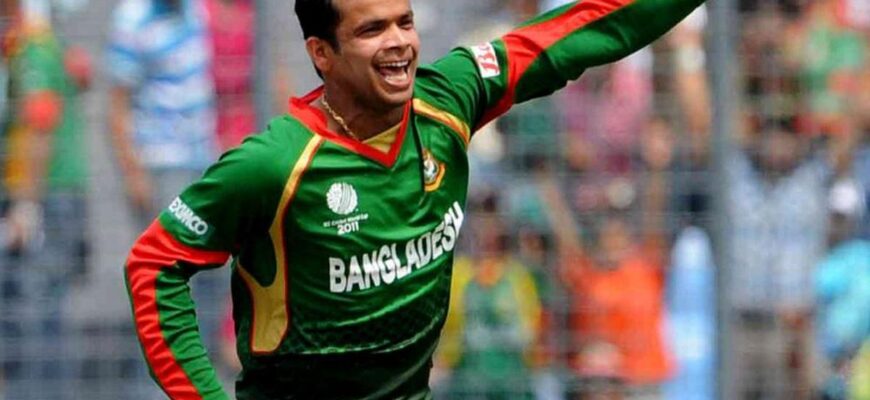In the ever-evolving landscape of professional cricket, player transitions from the field to administrative roles are a familiar sight. However, when a seasoned figure like Abdur Razzak, Bangladesh`s former left-arm spin maestro, decides to step away from the selector`s panel to contest the Bangladesh Cricket Board (BCB) elections, it signals more than just a change of scenery – it marks a strategic pivot into the intricate world of cricket governance.
The Bowler Turns Bureaucrat: A New Challenge Awaits
Abdur Razzak, a name that resonates with left-arm spin artistry and dedicated service to Bangladeshi cricket, has officially resigned from his position as a national selector. His declaration is clear and succinct: he aims to join the electoral race for the BCB`s board of directors. This isn`t merely a move to another department; it`s a calculated shift from technical decision-making on player selection to strategic policy-making within the highest echelons of the sport`s governing body in Bangladesh.
“I have resigned from the selectors post to join the BCB election,” Razzak confirmed, expressing a desire to embrace a “new challenge” after years as both a player and a selector. He articulated a vision to serve the nation in a different capacity, should he be elected to the board.
For many former athletes, the transition into administration represents a natural progression. It`s an opportunity to leverage years of on-field experience to influence the sport`s future from behind the scenes. Razzak`s decision to eye representation for the Khulna Division underscores a common ambition: to ensure regional voices are heard and local cricketing interests are championed at the national level. It`s a move from analyzing spin variations to navigating board resolutions, from judging a player`s form to influencing the game`s very structure.
The BCB Electoral Arena: A Game Off the Pitch
The Bangladesh Cricket Board elections, scheduled for October 6, are far from a simple formality. They represent a complex interplay of power, regional representation, and often, contentious administrative maneuvers. The process involves a meticulously curated list of councillors and a multi-tiered system for electing directors.
Understanding the Electoral Structure:
- Director Composition: The board will comprise 25 directors. This includes 12 from clubs, 10 representing various divisions and districts, two nominated by the National Sports Council (NSC), and one from a category representing other organizations. These directors, once elected, will then choose the president.
- The Voter List: The Election Commission of BCB finalized a voter list of 191 councillors. This list is the bedrock of the entire electoral process, determining who has the power to shape the future of Bangladeshi cricket.
The path to finalizing this list, however, was not without its administrative drama. Cricket governance, much like politics, often has its own peculiar set of challenges and controversies. For instance, 15 Dhaka-based clubs, initially excluded from the draft list due to an ongoing investigation by the Anti-Corruption Commission (ACC) for alleged irregularities, were ultimately reinstated. The reasoning? They had yet to be formally convicted. It`s a pragmatic, if not slightly ironic, nod to due process – “innocent until proven guilty,” even in the realm of cricket elections.
Similarly, the councillorships of five specific districts – Sylhet, Bogura, Pabna, Sirajganj, and Naogaon – were also granted, though the Narsingdi district`s representation remained vacant. Even former BCB president Faruque Ahmed saw his councillorship upheld after providing a satisfactory explanation for a late submission, indicating that explanations, when deemed satisfactory, can indeed smooth over procedural bumps.
The election machinery is now in full swing, with nomination forms distributed and candidates like Razzak submitting their bids. This period, characterized by hearings on objections and meticulous verification, highlights that the administrative game can be as intense and strategic as any played on the field.
What Razzak`s Candidacy Means for Bangladesh Cricket
Abdur Razzak`s entry into the BCB election race is significant. His long career as a prominent national player and subsequent stint as a selector provides him with invaluable first-hand experience from both playing and technical management perspectives. Should he be elected, his insights could be crucial in bridging the gap between the players` needs and the board`s strategic directives. It represents a potential injection of direct cricketing understanding into the often-complex world of sports administration.
This move underscores a broader trend globally where former cricketers seek to contribute beyond their playing days, aiming to shape the sport`s destiny. For Bangladesh cricket, Razzak`s “new challenge” could translate into a fresh voice, grounded in practical experience, contributing to decisions that will impact the nation`s cricketing future for years to come.









